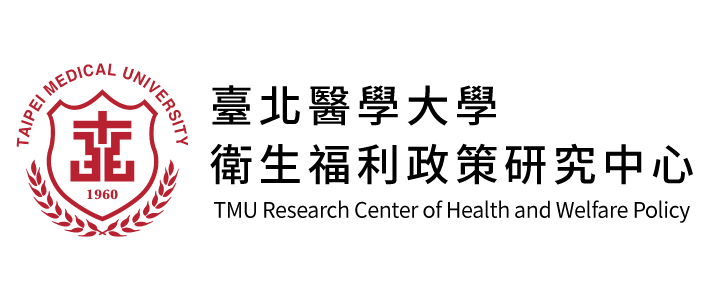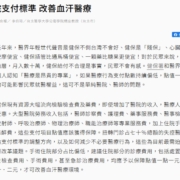【Column Article】United Daily News Network “Lee Po-Chang’s Column | Adjusting Hospitalization Payment Standards to Improve the Overburdened Healthcare System”
United Daily News Network
“Lee Po-Chang’s Column | Adjusting Hospitalization Payment Standards to Improve the Overburdened Healthcare System”
Published on: 2025-01-11 05:28
United Daily News / Lee Po-Chang / Chair Professor, College of Public Health, Taipei Medical University
For years, young voices in the medical community have lamented that Taiwan cannot truly thrive without reforming the National Health Insurance (NHI) system. Criticisms include labels like “cheap insurance,” and remarks such as “CPR costs less than foot massages,” “intubation is cheaper than unclogging a drain,” or “a pill costs less than candy.” From the public’s perspective, doctors are seen as a high-income group earning tens of thousands of dollars monthly. Thus, complaints about unreasonable NHI reimbursements often fail to resonate with the public. However, the National Health Insurance Administration (NHIA) and the medical community have a shared responsibility to convey to the public that “healthcare is an expensive profession.” Persistently low payment standards and diluted point values not only jeopardize the quality of medical services but also threaten patients’ access to care. These issues go far beyond being just hospital or physician concerns.
Currently, a significant portion of NHI resources is funneled toward diagnostic tests and drug expenses. While this may increase hospital revenues, medical professionals often do not benefit directly. Labor-related income at major hospitals, including fees for physician consultations, nursing, pharmacy services, and other professional services (e.g., laboratory technicians, radiologists, respiratory therapists, physical therapists, and occupational therapists), along with inpatient surgery and anesthesia fees, must be safeguarded. It is critical to address the excessive focus on outpatient services, which account for 70% of total spending, and instead, adjust payment standards and reduce unnecessary medical procedures. Reforming the payment structure for inpatient services, including treatment costs, invasive diagnostic procedures, surgical fees, and even emergency treatment fees, is a pressing matter. Suggested adjustments include ensuring a point value of NT$1.1 to NT$1.2 to alleviate the burden on healthcare professionals.
One of the most criticized aspects of the current system is the reimbursement for life-saving procedures. For example, cardiopulmonary resuscitation (CPR), performed during emergencies, earns only 1,800 points (per 10 minutes). This procedure involves multiple physicians, advanced practice nurses, and clinical nurses working under immense pressure, directly impacting patients’ lives. Similarly, emergency intubation for patients who cannot breathe is reimbursed at just 835 points. After deductions, physicians often earn less for such procedures than plumbers earn for unclogging a drain. Other examples include catheter placements (363 points), nasogastric tube insertions (195 points), suctioning (30 points per session of 10-20 minutes), and emergency wound treatment (420 points). Even simple sutures of wounds under five centimeters receive only 200 points, a value that is less than the price of a bowl of beef noodle soup.
Intensive care units (ICUs), a critical area for life-saving healthcare, face even greater challenges. The low reimbursement rates in ICUs urgently require resolution. For instance, NHI reimburses nursing care in ICUs at 4,716 points, even though ICU nurses typically care for only one or two patients under highly stressful and demanding conditions. After factoring in point value adjustments (e.g., a 10% deduction), ICU nurses’ hourly wages fall below NT$190, which is lower than the current minimum wage. For attending physicians in ICUs, daily consultation fees are reimbursed at 1,925 points. For a 12-bed ICU, the NHI reimburses only 23,100 points daily for all attending physicians’ consultation services, amounting to an hourly rate of less than 1,000 points (around NT$900). Despite their passion and dedication, healthcare professionals are unable to sustain enthusiasm when their work is undervalued and underpaid.
In recent years, NHI payment reforms have seen some progress. In 2017, 1,716 critical care items were adjusted, involving NT$6 billion. In 2020, both hospital and primary care payment standards were revised, with an additional NT$12.4 billion allocated, including NT$2.273 billion for 400 critical care procedures. In March 2021, another NT$8.226 billion was allocated to adjust 108 basic diagnostic procedures under hospital budgets.
Adjusting payment standards under the NHI system remains a complex challenge, particularly within the constraints of the global budget system and the need for balance across specialties. Decades of low and outdated payment standards have created deep resentment within the medical community, turning it into a pressure cooker nearing its breaking point. Immediate action is required to address these concerns. If critical care continues to rely solely on altruism, passion, and a sense of mission, the cultivation of healthcare talent and the sustainable development of hospitals will become nearly impossible.
Original Article Source:
United Daily News Network – “Adjusting Hospitalization Payment Standards to Improve the Overburdened Healthcare System”



